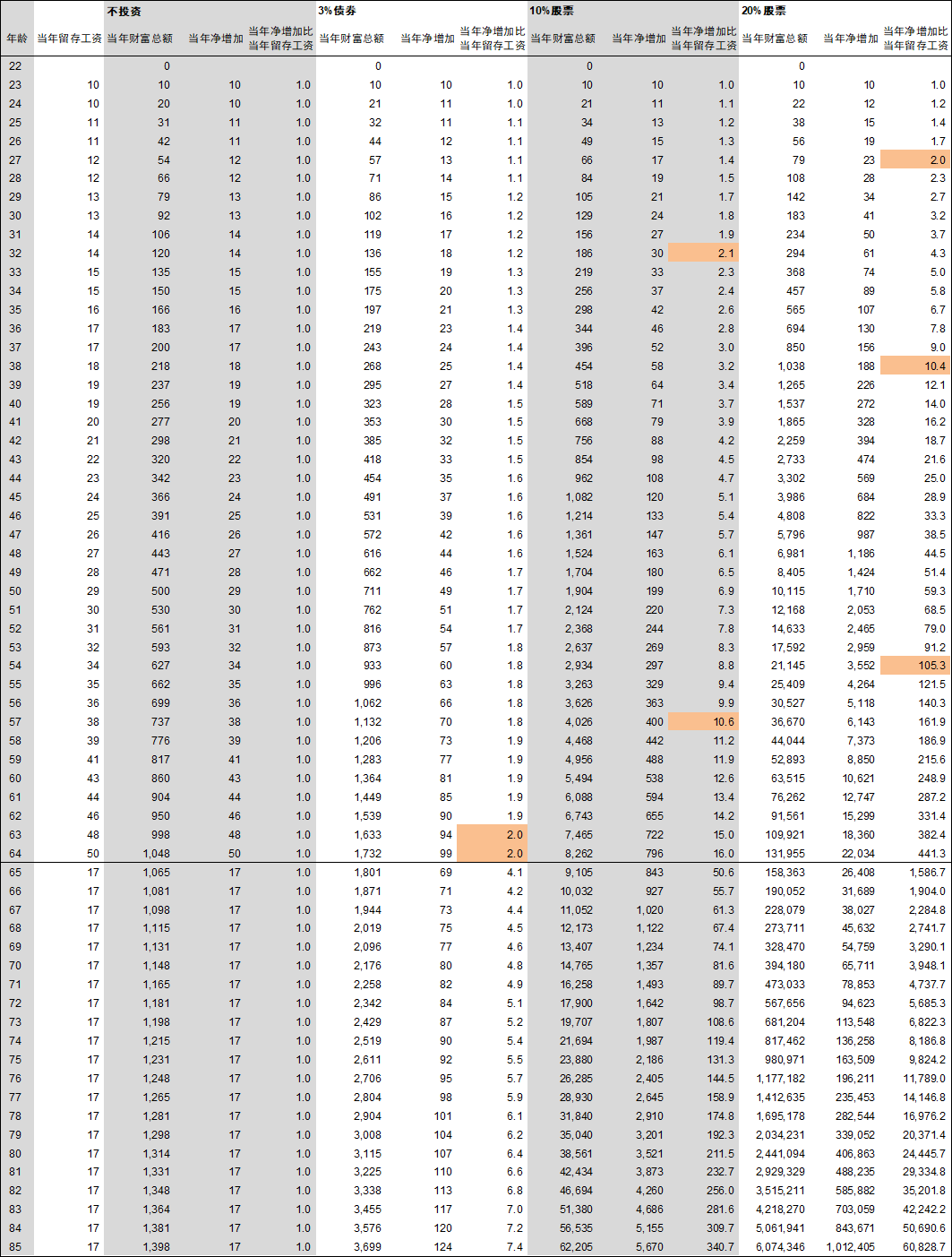
Chen Jiahe Chief Investment Officer of Qingquan Technology
How important investing is is something that many people don’t understand. In today’s commercial society, apart from things that cannot be measured materially, such as physical and mental health, investing in our personal life may be the most important thing from a monetary point of view, and its importance is even far more important than getting a salary at work .
However, as far as my own observation is concerned, the energy and enthusiasm most people put into their work may be a hundred times their personal investment. People work hard in the company during the day, go home at night and rack their brains to think about the business and personnel of the unit, but only put a little energy into research on their investment accounts.
Similar to office workers, many students put great effort into learning the content of their own majors, but have little knowledge of investment. As everyone knows, from the perspective of a lifetime of money, investment is far more important than a lifetime of wages.
In the planned economy era, the ideal of many people is to dedicate their entire lives to work. However, in today’s commercial society, when the vast majority of people have signed labor contracts with clear terms and conditions, both parties can conditionally terminate the contract, and when business and money dominate most social activities, investment has become Become something that is far more important than work.
Different from dedicating our youth to work in the past, today we may be proud to say: we want to dedicate our whole life to investment.
First of all, from the perspective of time span, most of the better jobs now require at least a bachelor’s degree or even a postgraduate degree, so people can only work formally when they are 22 or 25 years old. However, securities accounts can be opened at the age of 18, and there is no age limit for fund accounts. You know, Warren. Buffett bought his first stock in his life when he was 12 years old. Obviously, compared with the working life, the investment career has won at the starting line.
And from the finish line, the investment is a big winner. According to the prevailing retirement system, people usually retire between the ages of 55 and 60, and some retirees can work until they are 65 to 70. Occasionally, only old doctors and professors can work until their 80s.
However, investing is something that has no retirement age: unless you make a serious mistake of pressing the wrong leverage and buying a bankrupt company, no one will let you retire, and you can work as long as you live.
In 2021, China’s average life expectancy will reach 78 years, and Shanghai will reach 84 years. In the United States, Buffett, Charlie. Munger, Walter Schloss worked into his 90s: that’s about 30 years after the normal retirement age.
It can be seen that from the perspective of duration, investment is far more important than our work. So, how important is the investment from a monetary return perspective? Here, let’s make a model that covers a lifetime of financial planning. Through the simple calculation of this model, we can find that the importance of investment is far greater than that of work.
A model to see the importance of investment
Let us assume that a person started working after graduating from university at the age of 22. After deducting all expenses at the age of 23, he saved a net salary of 100,000 yuan, and the retained salary grew at a rate of 4% every year thereafter (for simplicity, we do not consider Inflation factored, all figures are current price figures).
At 64, the man retired. Let us assume that he can retain 1/3 of his retirement salary each year in the last year before retirement. Through simple calculation, it can be known that in the last year before retirement, the retained salary of this person was exactly 500,000 yuan, so the annual retirement salary after that is 170,000 yuan. In today’s society, this is a typical salary level for middle and upper-class white-collar workers.
At the same time, in the model, we assume that this person lives to the age of 85: approximately the average life expectancy in Shanghai today.
Now, let’s assume 4 scenarios: 1. No investment at all; 2. Bond-based investment with 3% annual return; 3. Average but successful stock investment with 10% annual return; 4. Buffett-level success Investment, 20% per year. Using an Excel spreadsheet to make a model, we can see the difference.
Before analyzing each situation, I want to introduce a concept: the ratio of the net increase in wealth in the current year to the retained wages in the current year. To put it simply, if the total wealth increased by 300,000 yuan in this year, and the salary in that year was 200,000 yuan, then the ratio is 1.5.
In this measurement caliber, a ratio of 2 is a very important watershed, because 2 means that exactly 50% of the wealth increase in the year came from investment and 50% from wages. That is to say, for personal finance, the return on investment and salary return at this time are completely equal in importance.
Next, let’s take a look at how the four situations evolve.
In the first case, that is, when there is no investment at all, the total wealth at retirement (64 years old) is 10.48 million yuan, which happens to be the accumulation of lifetime wages. In the last year of life, the total wealth was 13.98 million yuan: a simple addition.
In the second case, that is, to increase one’s wealth at a rate of 3% per year (this is also the return that most long-term bonds can give), the net increase in wealth of this year compared with the value of retained wages in that year will be between 63 and 2.0 at age 64.
That is, increasing wealth at a slow, 3% rate, and only until retirement will the money come from investments as much as from wages. When you retire at the age of 64, the total account will reach 17.32 million yuan, which is not much more than the 10.48 million yuan in the first case.
However, in case 3, a 10% return on equity, things start to look different. The ratio of the net increase in wealth in that year to the salary retained in that year exceeded 2 for the first time at the age of 32 and reached 2.1: At this time, the return on investment began to exceed wages, although wages were also increasing at a rate of 4% (always enjoying promotions and salary increases) .
With a 10% return on investment, at the age of 57, the above ratio exceeds 10 for the first time, reaching 10.6. In other words, of the increase in total wealth this year, only 1% came from wages and 9.6% from investment. When he died at the age of 85, the total wealth under the 10% investment return reached 622.05 million yuan, far exceeding the 13.98 million yuan when he did not invest, or the 36.99 million yuan when he invested in bonds.
And if we can really achieve the fourth situation of investment, that is, the annualized rate of return reaches 20%, the situation will become even more different. Since Buffett’s lifetime compound growth rate is about 20%, this can also be called a “Buffett-style assumption.”
In this case, a young man who graduated at the age of 22 and started saving money at the age of 23, as long as he reaches the age of 27, the ratio of his net increase in wealth in that year to his retained salary in that year will reach 2.0. In other words, only from the age of 27, the wealth brought by this person’s investment has begun to exceed the salary income that his own job can bring: although he has also been promoted and raised in the workplace.
Only at the age of 38, the above ratio will exceed 10 for the first time, reaching 10.4. At the age of 54, this ratio will exceed 100, reaching 105.3. And at the time of retirement, the total wealth of this person will reach 1,319.55 million yuan, which is more than 100 times that of 10.48 million yuan in the first case. At the time of death at the age of 85, the total wealth will reach 60,743,460,000 yuan, which is 4,346 times that of the first case.
Now, you will understand why Buffett is so rich, right? Perhaps, you will also understand why Buffett left the enviable Wall Street at the age of 26 and returned to his hometown to invest: because of his rate of return, since then, he really didn’t think much of it. Get the wages you can earn from a part-time job.
Of course, many details have been ignored in the above model. For example, a 10% return on investment does not mean 10% every year, and it will go up and down in a few years; the increase in wages is not uniform; Not factored in, typically the figure is between 2% and 3%, and Buffett’s long-term CAGR of 20% includes inflation. Still, these details don’t change what the model tells us: Investment really matters, far more than the wages we can earn.
Why do I always feel that work is more important than investment?
So, why is investment so important, but most of us don’t put enough energy into investment, even less than 1% of our daily study and work? Think about how many school classes you’ve taken, how many company profiles you’ve written, and how many public company and mutual fund annual reports you’ve read this week, and you’ll see what I mean.
The reason is simple: In our daily work, we will constantly encounter stimuli other than money to remind us that “work is important”. But in investment, there is nothing but dumb money.
In the investment life, all we can encounter are cold figures and boring reports. There are no flowers, no applause, no envy from colleagues when raising salary, no encouragement from leaders when winning awards at the annual meeting, no praise from relatives when promoted, and no praise from society when career progresses.
There is only money in the account. Today, the money doesn’t even shine like gold, it’s just a bunch of boring electronic symbols, that’s all.
For the vast majority of people, the sensory stimulation of work far outweighs investment. People are attracted by the glory in front of them, and are fettered by daily chores, but they forget that almost all jobs will leave us in our 60s, but investment can stay with us for a lifetime and bring far more money than work .
So, in those colorful and full of joy, anger, sorrow and joy, people forget to measure the real financial return and give almost all their energy to work. And the investment career that will really bring more returns is neglected by us: this may be the greatest spectacle in today’s business society.
Figure: Assuming that a person starts saving money at the age of 23, retires at the age of 64, and dies at the age of 85, the financial situation calculation under different investment returns

There are 40 discussions on this topic in Xueqiu, click to view.
Snowball is an investor social network where smart investors are all here.
Click to download Xueqiu mobile client http://xueqiu.com/xz ]]>
This article is transferred from: http://xueqiu.com/1340904670/238513241
This site is only for collection, and the copyright belongs to the original author.